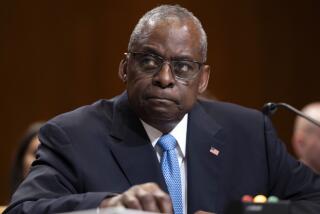Senators Urge Russia Disarmament Aid
- Share via
WASHINGTON — The United States should speed up assistance to Russia and three other nuclear-armed former republics of the Soviet Union to help them destroy their nuclear arsenals, a high-level Senate delegation recommended Friday.
Warning against the danger of delays during the U.S. presidential transition, the delegation specifically urged action, before President Bush leaves office, to complete ratification of the landmark START weapons-reduction treaty and signing of a follow-up agreement to slash the number of long-range missiles on both sides.
The possibility of an unauthorized nuclear launch from the former Soviet republics has increased, even while the threat of a full-scale nuclear attack is at an all-time low, according to Sen. Sam Nunn (D-Ga.), chairman of the Armed Services Committee, and Sen. Richard Lugar (R-Ind.), senior GOP member of the Senate Foreign Relations Committee.
“Strategic nuclear weapons are now situated in four new countries, and each of these countries faces severe internal strains,” Nunn and Lugar said in a report. “There is also the growing risk of proliferation of weapons of mass destruction, nuclear technology and materials, and nuclear know-how.”
The report was based on a November visit to Russia, Ukraine, Kazakhstan and Belarus, where Nunn and Lugar met with senior officials, including Russian President Boris N. Yeltsin.
The four former republics have promised to destroy their long-range nuclear weapons in separate agreements with the United States that provide for the weapons to be moved to Russia and dismantled. While Kazakhstan and Belarus have made significant strides toward compliance, Ukraine has balked at handing over the weaponry to Russia.
The START I treaty, signed in 1991, set overall ceilings on the number of warheads that the United States and the Soviet Union could possess in 1997 and beyond. Later agreements with the four republics that had nuclear weapons provided that the weapons would be transferred to Russia and then destroyed.
The START II treaty, agreed to in principle last June, has not yet been put in final language. But it would require both Russia and the United States to reduce the number of their strategic weapons to fewer than 3,500 on each side by 2003 at the latest.
Congress has authorized $800 million for the various dismantling programs, and Lugar and Nunn proposed that the timetable for spending it be speeded up.
They said senior Russian military officials expressed concern about control of nuclear weapons in Ukraine and said they might have to renounce responsibility for the security of those weapons because of a “deteriorating” situation.
Faltering economic reform in the former Soviet Union, they said, may undermine disarmament efforts. “Economic deterioration can increase the odds of social and political unrest and put in question the security of nuclear weapons as well as destabilizing conventional weapons, such as heat-seeking missiles capable of downing civilian airliners,” they reported.
They urged the Bush Administration to take a series of steps to get Ukraine to ratify the START I treaty to reduce nuclear arms so it can take effect before Bush leaves office next month. They also said there is a “reasonable chance” of signing a second START treaty with Russia before Jan. 20 despite some remaining obstacles.
Times staff writer Norman Kempster contributed to this report.
More to Read
Sign up for Essential California
The most important California stories and recommendations in your inbox every morning.
You may occasionally receive promotional content from the Los Angeles Times.











